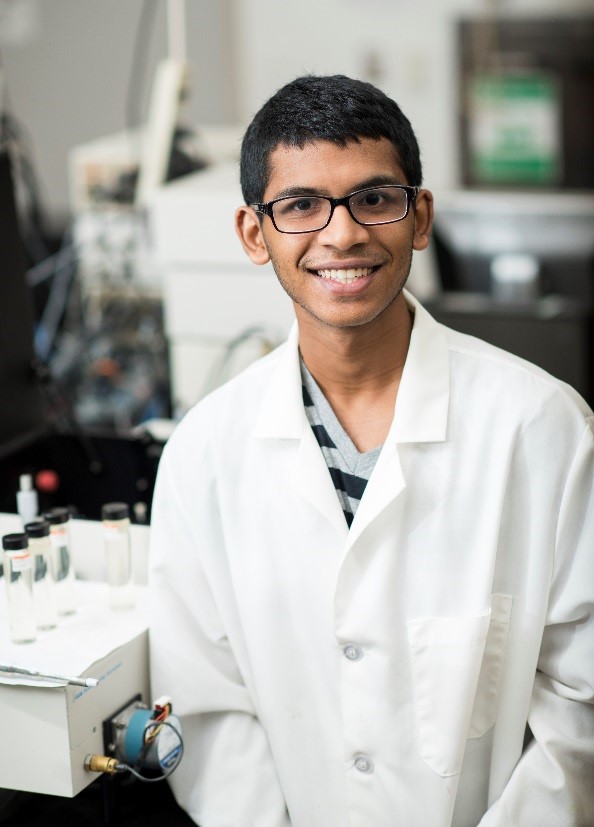
DENTON (UNT), Texas — When Prateek Kalakuntla learned that between 6,000 and 12,000 children in Flint, Michigan, may experience serious health problems because their drinking water contained high levels of lead, he wondered about a solution.
“This is a problem in developing countries. Communities need a low-cost way to detect mercury, lead and other toxins,” he said.
So Kalakuntla, a student at the University of North Texas’ Texas Academy of Mathematics and Science, created such a sensor in the laboratory of Mohammad Omary, University Distinguished Research Professor in the Department of Chemistry.
Kalakuntla’s research has led to his being named a national finalist in the 2016 Siemens Competition in Math, Science and Technology. He will attend the competition Dec. 2-6 in Washington, D.C to compete with 11 other finalists for the top prize of a $100,000 scholarship. He is guaranteed at least a $10,000 scholarship.
Kalakuntla entered college two years early in fall 2015, when he entered the Texas Academy, known as TAMS. The program allows students who are the same age as high school juniors and seniors to do research in UNT faculty members’ laboratories, as well as complete regular UNT courses. Kalakuntla has worked for a year in
The Siemens Competition is the one of the nation’s premier research competitions for high school-aged students, promoting excellence in math, science and technology by encouraging students to undertake individual or team research projects.
Glenisson de Oliveira, TAMS dean, called Kalakuntla "a very insightful and dedicated young scholar" who has found TAMS "a perfect fit for him, given the opportunities available at UNT.
"He found an ideal research environment in Dr. Omary’s lab, in particular. With a fantastic mentor, Prateek’s creativity soared, and his standing in the Siemens competition is a tribute to his significant contributions to science," de Oliveira said.
To create his sensor, Kalakuntla investigated the use of phosphorescent materials and methods for sensing and removing mercury and other toxic heavy metals from water. He combined gold with a ligand — a molecule that binds to a receptor — to synthesize a substance that usually has a green emission but has a reduced emission in the presence of mercury. The substance can be placed in soil or water.
“I’m proud that the sensor has materials that are very easy to obtain and at low cost,” he said, adding that he hopes to someday develop a sensor that is biologically compatible with the human body and will sense mercury concentrations in the brain.
Kalakuntla was first named a regional finalist in the 2016 Siemens competition in October and received a $1,000 scholarship. He presented his research before a panel of judges on Nov. 19, competing against four other students presenting individual projects and five teams of students presenting group projects.
The son of Madhu and Vijitha Kalakuntla of Plano, Kalakuntla attended Jasper High School before entering TAMS in August 2015. At TAMS, he is the volunteer coordinator for Mu Alpha Theta math club and launched a program to tutor elementary and middle school students in math. He is also in the TAMS Robotics Club and was named a National Merit semifinalist in September.
About TAMS
UNT's Texas Academy of Mathematics and Science is the nation’s first early college entrance residential program for gifted high school students. Mentored by faculty at UNT, TAMS students tackle complex, real-world problems, working on solutions and breakthroughs in fields ranging from healthcare to energy consumption. It's an important pipeline for STEM education, nurturing the next generation of innovators, and is one of the many ways UNT advances science, engineering and technology.




